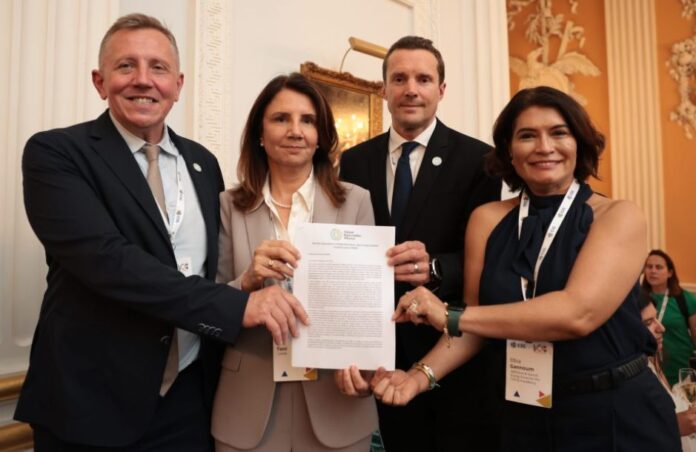A wave of renewed private sector commitment is reshaping global investment trends in renewable energy, as leading companies and industry alliances pledge to accelerate clean energy deployment ahead of the COP30 climate summit in Belem, Brazil. A new initiative led by the Global Renewables Alliance (GRA) underscores the private sector’s role in delivering on global climate goals, particularly the ambition to triple renewable energy capacity, double energy efficiency, and phase out fossil fuels by 2030 — key targets agreed at COP28.
Surge in Private Sector Investment
The investment momentum is already evident. In Brazil alone, over 21 GW of renewable capacity was added in 2024 — 18 GW solar and 3.3 GW wind — backed by nearly USD 37 billion in clean energy investments and the creation of more than 340,000 jobs. This signals strong investor appetite and the profitable nature of clean energy ventures.
Private companies — including global players like Orsted, Iberdrola, ENGIE, and Fortescue — are driving this expansion, buoyed by supportive policies, growing public demand for climate action, and the economic viability of renewables. A recent survey found 97 percent of business leaders support a shift to renewables, highlighting the growing alignment between private capital, societal expectations, and long-term climate targets.
Call for Policy and Infrastructure Reform
While investment flows are increasing, the coalition warns that barriers such as grid congestion, high financing costs, and slow permitting are stalling progress. To address these, the letter titled Mutirao: Scaling Renewable Energy outlines seven priority actions for governments to adopt at COP30.
7-Point Agenda for Accelerating the Global Energy Transition at COP30
#1 Host a Leader-Level Energy Transition Moment at COP30
Facilitate a high-level platform where governments and private sector leaders can present national delivery plans and tangible progress on the Global Stocktake (GST) goals—beyond existing Nationally Determined Contributions (NDCs).
#2 Adopt and Update Renewable Energy Targets Aligned with 1.5°C
Encourage countries to set or enhance 2030 and 2035 renewable energy goals, aligned with the Paris Agreement, and integrate them into updated NDCs and national energy strategies.
#3 Deliver National Grid and Storage Action Plans
Promote the creation of infrastructure blueprints with defined targets and investment pathways for electricity grids and storage systems to support economic electrification and job creation.
#4 Mobilize Finance for Clean Energy in Emerging Economies
Showcase how climate finance, including commitments made at COP29 in Baku, is being deployed — highlighting bankable project pipelines, financial instruments, and mechanisms that de-risk renewable investments.
#5 Support Green Industrial Development
Push for national clean industry strategies and demand-side mechanisms, especially for sectors like steel and fertilizers. Aim to showcase at least 20 global clean industrial projects, with Brazil championing green exports.
#6 Launch UNFCCC Dialogue on Transitioning from Fossil Fuels
Initiate a formal process to define a managed and just transition away from fossil fuels, incorporating timelines, national commitments (e.g., Brazil’s NDC), and monitoring frameworks.
#7 Finalize Article 6 Implementation Guidelines
Conclude negotiations on Article 6 by setting clear rules for carbon accounting (corresponding adjustments), ensuring environmental integrity, and harmonizing voluntary and regulatory carbon markets.
These reforms are seen as critical enablers to unlock further private sector capital and ensure the scalability of successful models.
Towards a Decade of Implementation
COP30 is being positioned as the launchpad for a “decade of implementation” following the Global Stocktake. The message from the private sector is clear: the technology is proven, the capital is ready, and the transition is underway. Now, governments must act decisively to provide the policy stability and infrastructure investment needed to accelerate delivery.
As COP30 Special Envoy Elbia Gannoum stated, “Brazil has shown what’s possible with consistent policy and private sector leadership — but to scale it globally, we need to fix the fundamentals.”
The letter to the COP30 Presidency is coordinated by the Global Renewables Alliance and backed by a broad coalition of leading companies and industry associations committed to accelerating the global energy transition. Signatories include major corporations such as ARUP, CIP, EDP, Fortescue, Iberdrola, Octopus Energy Generation, Orsted, SSE, Sunotec, Aeris, Atlas Agro, ANE Brazil, E+ Energy Transition, EDF Power Solution, ENBPar, ENGIE, Goldwind, Green Energy Park, Hitachi Energy, Hydro, Mingyang, Moeve, Neoenergia, Norte Energia, Ocean Winds, Prumo, and Renova Energia.
In addition, key industry associations have endorsed the letter, including ABEEólica, ABIHV, ABRAGE, ABSAE, ABSOLAR, CELA, CERNE, the Global Wind Energy Council, the Global Solar Council, the Green Hydrogen Organisation, the Long-Duration Energy Storage Council, the International Hydropower Association, and the International Geothermal Association. Together, they call for decisive action at COP30 to deliver on the Global Stocktake goals and enable a just and rapid transition to clean energy.
Outlook
Looking ahead, investment in renewable energy is expected to intensify, especially in markets with supportive regulatory environments. The GRA-led letter remains open for new signatories and will continue to be presented to governments and institutions worldwide. The message from global businesses is unified: confidence, coordination, and capital are the pillars needed to turn climate commitments into real-world transformation.
GreentechLead.com News Desk

